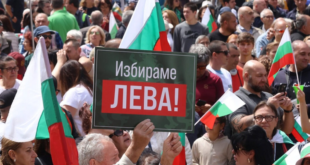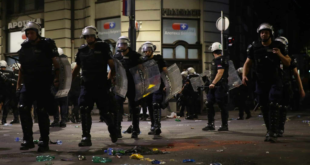One year ago, Europe’s largest camp for displaced people—Moria camp on the Greek island of Lesbos—was destroyed by several fires that erupted across September 8 and 9, 2020. This tragic event, which left some 12,000 people stranded with no safe place to stay, starkly illustrated the complete failure of the European Union’s (EU) “hotspot” approach to migration.
“The night of the fire I realized that Europe does not have humanity,” said Ali*, a survivor of torture in Syria who has lived on Lesbos for a year and a half. “We were so scared. For almost two weeks, we were homeless in the streets. It felt like you were under siege in Syria. There was no water, not even [a] toilet. It was shameful for Europe.”
Following the fires, the EU and Greek leaders promised “a fresh new start” on migration, but have instead continued to deny basic rights and dignity for asylum seekers and migrants searching for safety in Europe, forging ahead on plans to construct more prison-like camps on five North Aegean islands.
“Whatever we say will not make any difference”
Recently, Doctors Without Borders/Médecins Sans Frontières (MSF) moved some services on Lesbos closer to Kara Tepe camp—originally an “overflow” camp that now hosts 3,500 people, including many who were forced to evacuate Moria, in equally inadequate conditions. “There is no difference between the old Moria and Kara Tepe camp,” said Ali. “The procedures are the same, it is the same system. Everyone knows what is going on in this shameful camp, but they cannot feel our pain. Whatever we say will not make any difference.”
MSF’s patients continue to report deteriorating health and mental health related to the arbitrary asylum process, a fear of deportation, and precarious living conditions. “We are in [a] bad mental [state],” said Mariam*, from Afghanistan, who has spent two years on Lesbos with her husband and their two-year-old daughter. Mariam and her family were also living in Moria camp when the fires erupted—they were forced to evacuate and slept on the streets for 10 days. They now live Kara Tepe.
“The living conditions continue to be difficult; we don’t have a good life here,” said Mariam, who is about to give birth to another child. “I don’t know if we can get recognized as asylum seekers or if we are going to get another rejection. My little girl tends to [show] aggressive behaviors because of what she has witnessed here. She doesn’t like to play with friends, to laugh, to speak, or to play with dolls. All there is in her mind is the violence she has witnessed here: The fights in the camp, the time that we had to run away, the fires, the teargas.”
“My wish is to live like a normal person”
People who have experienced significant trauma have difficulties processing distressing memories, and so live in a persistent state of fear. Children who receive mental health support at MSF’s clinic on Lesbos often exhibit regressive behaviors including aggression; withdrawal; bedwetting; or delays in cognitive, emotional, and social development. Post-traumatic stress disorder and depressive disorder symptoms are among the most common mental illnesses our clinicians see, accounting for approximately 50 percent of illness in both our child and adult patients.
“My wish is to get better psychologically and live like a normal person,” said Mariam. “I don’t like to be told where to go, where not to go, and what time to go in and out [of the camp]. I wish, like all people do, [for] a good life without stress and to have a house and for my daughter to play in.
As humanitarian crises continue to unfold in many parts of the world, MSF repeats its call for the European Commission, Greece, and European States to implement policies that are focused on protecting and assisting refugees and asylum—not on ways to deter, stop, and deport those who are seeking safety in Europe.
“In Greece, the future looks more dystopian than ever,” said Konstantinos Psykakos, MSF’s head of mission in Greece. “Those who [manage] to cross the Aegean Sea continue to live in miserable camps on the Greek islands. As the rest of world observes the latest developments in Afghanistan, the EU and Greek [authorities] are [preparing to inaugurate] a new center on Samos Island [that will] trap refugees in prison-like conditions— [many of whom have come from Afghanistan]. This is [a striking] demonstration of the cruelty of the EU’s migration policies.”
 Eurasia Press & News
Eurasia Press & News



